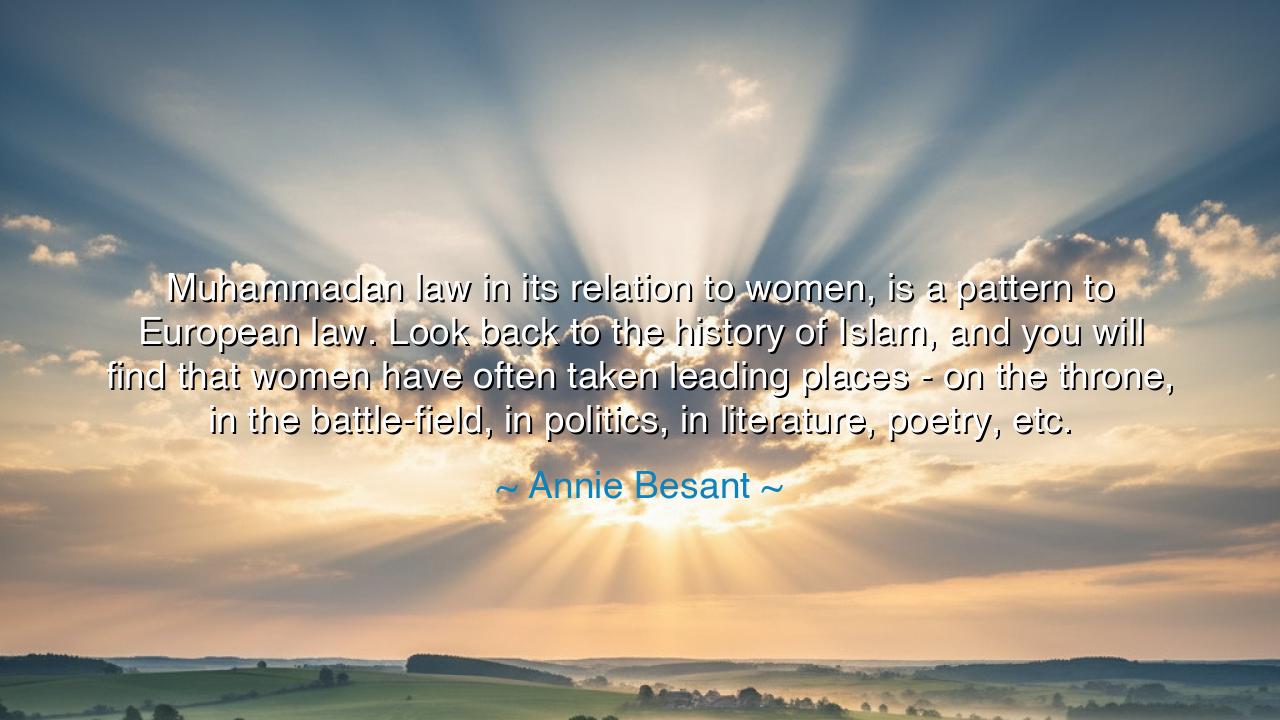
Muhammadan law in its relation to women, is a pattern to European
Muhammadan law in its relation to women, is a pattern to European law. Look back to the history of Islam, and you will find that women have often taken leading places - on the throne, in the battle-field, in politics, in literature, poetry, etc.






When Annie Besant, the fiery orator, philosopher, and champion of justice, declared, “Muhammadan law in its relation to women, is a pattern to European law. Look back to the history of Islam, and you will find that women have often taken leading places — on the throne, in the battle-field, in politics, in literature, poetry, etc.”, she spoke not merely as a scholar, but as a seeker of truth unchained by prejudice. In an age when the West still wrestled with granting women the dignity of equality, Besant turned her gaze eastward — to the civilization of Islam, where she found a heritage of strength, intellect, and honor bestowed upon women centuries before Europe had learned to name such ideals. Her words, bold and unexpected, shine with the courage of a woman who refused to bow to the narrow judgments of her time.
In these words lies a profound recognition — that justice and dignity are not the inventions of any single culture, but the inheritance of humanity. Besant saw that in the early centuries of Islam, women were not mere shadows of men, but stars in their own right — scholars, rulers, warriors, and poets. She had studied deeply, and found in the Qur’an and Islamic law protections for women’s property, inheritance, education, and personal autonomy that Europe had only begun to dream of in her era. To her, Islamic law was not oppression as her contemporaries claimed, but balance — a structure built upon moral duty and social respect. She reminded her readers that the first believer in the Prophet’s message was a woman, Khadijah bint Khuwaylid, a merchant of immense wealth and wisdom, who stood not behind the Prophet, but beside him.
Indeed, history bears witness to the truth Besant spoke. When she invoked “women on the throne and in the battle-field,” she summoned memories of figures like Aisha bint Abu Bakr, scholar and narrator of hadiths, whose knowledge shaped the very understanding of faith; Razia Sultana, who ruled Delhi with courage and intelligence; Shajar al-Durr, who defended Egypt against the Crusaders; and Fatima al-Fihri, who founded the world’s first university in Fez — a sanctuary of knowledge for both men and women. These women were not anomalies, but proof of a civilization that honored intellect and character, not gender alone. Their stories form the living echo of Besant’s words — that the Islamic tradition had, in its essence, empowered the feminine far before the Enlightenment awakened the same spirit in Europe.
To understand the origin of this quote, one must look to the late nineteenth and early twentieth centuries — an era when Besant, once a Christian reformer and later a theosophist, turned toward Eastern wisdom to challenge the arrogance of colonial thinking. She saw in India and the Islamic world treasures of moral and social insight that Europe had ignored while boasting of its modernity. Her defense of Islam’s treatment of women was radical, for it reversed the Western narrative that had long painted Eastern societies as backward and tyrannical. In truth, she sought to awaken Europe to its own hypocrisy — to remind it that progress without justice, and civilization without respect, were hollow achievements.
In her declaration, Besant also speaks a deeper truth about human potential: that the greatness of a people lies in how they honor both their sons and their daughters. She knew that civilizations rise when they embrace the balance of masculine strength and feminine wisdom, and fall when they chain one half of humanity in ignorance. The “pattern” she saw in Muhammadan law was not a call to imitation, but to understanding — a call to see the principles of justice, education, and moral equality as timeless truths. What she admired was not a religion as dogma, but a civilization that, at its best, sought harmony between spirit and society.
Let us not mistake her praise for blind worship; Besant’s insight was not born of naivety, but of historical clarity. She saw that every faith, every nation, drifts from its ideals over time, and yet the ideals themselves endure — waiting for rediscovery by those who still seek truth. Her words, therefore, are both an honor and a challenge: a reminder to Muslims to reclaim the dignity once known to their foremothers, and to Europeans to humble themselves before a wisdom they once dismissed. It is the voice of one who sought unity among civilizations, rather than division — who believed that progress was not a monopoly of the West, but a shared inheritance of humankind.
So let this lesson ring across the ages: justice for women is not the gift of any age, but the test of every civilization. When women stand beside men in knowledge, power, and virtue, the world flourishes. When they are silenced, nations decay. Let us honor the spirit of Besant’s words — to look beyond prejudice, to see truth even when it comes from unexpected places, and to restore dignity to all who have been forgotten. For as the ancients taught, a society that uplifts its women builds its foundation upon the eternal — but one that diminishes them builds upon sand, and shall not stand.






AAdministratorAdministrator
Welcome, honored guests. Please leave a comment, we will respond soon